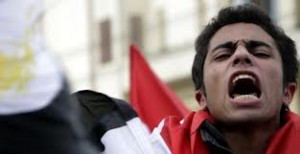 Amr Darrag is on a call when a second phone in his Cairo office begins to ring. He’s been awake since 6 a.m., and the stack of papers on his desk swells with every passing minute. A leader in Egypt’s Freedom and Justice Party, the political arm of the Muslim Brotherhood, Darrag is also part of the 100-member committee scrambling to draft the country’s new constitution—a pending document that has hit every possible bump in the road since Egyptians toppled President Hosni Mubarak last year.
Amr Darrag is on a call when a second phone in his Cairo office begins to ring. He’s been awake since 6 a.m., and the stack of papers on his desk swells with every passing minute. A leader in Egypt’s Freedom and Justice Party, the political arm of the Muslim Brotherhood, Darrag is also part of the 100-member committee scrambling to draft the country’s new constitution—a pending document that has hit every possible bump in the road since Egyptians toppled President Hosni Mubarak last year.
“We have a couple more days until we finish our mission,” says Darrag, secretary-general of the Constituent Assembly. “Those who are not interested in stability in Egypt or want to keep the Muslim Brotherhood out of the scene are trying to stop us from issuing the constitution. The courts want to dismantle the assembly. The president had to stop these tricks or the country would fall into chaos.”
On Nov. 22, as Americans sat down to Thanksgiving dinner, Egypt’s first post-revolution president, Mohamed Morsi, issued a decree exempting all of his decisions from legal challenge. The move was a stunning power grab that quickly earned him the nickname “Egypt’s new pharaoh”—a title once bestowed upon his defunct predecessor. Hundreds of thousands of disbelieving Egyptians flooded city streets from Alexandria to Aswan with a familiar cry: “The people want the fall of the regime!” Tahrir Square came alive once again with tents and bullhorns and a howl so loud—so impassioned—that it was dubbed the “19th Day” of last year’s revolution. Angry female protesters returned in masses to Tahrir, resilient after months of deteriorating security that included repeated incidents of harassment and sexual assault.
Morsi also declared that the courts cannot dissolve the Assembly, which many say is unfairly dominated by his fellow Islamists. As tensions built nationwide, the Assembly slammed together the first finalized draft of the constitution last week—a text that could set the course for Egypt’s future and that few have been privy to see.
“He shot himself in the foot,” says Steven A. Cook, the Hasib J. Sabbagh senior fellow for Middle Eastern studies at the Council on Foreign Relations. “Perhaps ‘new pharaoh’ is an overstatement, even though Morsi is no democrat. Somewhere within the councils of the Muslim Brotherhood, someone thought this decree would play well in Tahrir.”
Play well it didn’t. As antagonized protesters violently clashed with pro-Morsi demonstrators, the president defended his decision, insisting it is temporary and geared toward eliminating the bureaucratic hurdles obstructing Egypt’s unraveling transition. The comment inspired the snarky headline in independent daily Al-Masry Al-Youm: “Morsi is a ‘temporary’ dictator.” The Brotherhood brushed off the protests as merely “politics,” distinguishing it from the 2011 revolution, when “united Egyptians revolted against autocracy.” The organization warned, via Twitter, that a revolution without the Muslim Brotherhood is no revolution.
But that was a tough sell to make to those who descended on Tahrir, driven by lingering memories from 30 years of Hosni Mubarak’s chokehold. Less than two years after Egyptians earned their first taste of democracy, the country once again has a president with near-absolute power and no constitution to dictate otherwise (the decree was ironically introduced as a “constitutional declaration”). There is no Parliament, since the military generals dissolved it in June. Then the generals were replaced by Brotherhood loyalists—as were the heads of most state-run media organizations.
Egypt’s military said in a statement that it would not prevent protesters from voicing their opposition, an indirect slight to Morsi, who is the country’s first-ever civilian president. Meanwhile, dozens of casualties were reported last week amid violent police crackdowns, as pro- and anti-Morsi demonstrators squared off. “Mubarak’s repressive regime is alive and well,” Nobel laureate Mohamed ElBaradei wrote on Twitter of the déjà vu police brutality.
For the secular parties quickly eliminated in this year’s election, the time has come to do something about it. “Unity” was the catchphrase of the hour, as opposition leaders and former political rivals including Amr Moussa, Hamdeen Sabbahi, and ElBaradei marched through the throngs in Tahrir, arm in arm, calling for Egyptians to rise up against tyranny once again. However, history has shown that the secular movements—even unified—are no match for the Muslim Brotherhood, which has traditionally commanded a deep-rooted, far-reaching influence, even in its decades as an outlawed organization.
“This past week Morsi has done the impossible and mobilized a completely new section of the population—what we previously called the ‘Feloul’ [remnants of the last regime] and the ‘Couch Party,’” the inactive segment of the population, says secular activist Bahaa Hashem. “Most of those who were against the demonstrations in 2011 feared instability. Irony really does have a way of kicking you in the backside!”
Newsweek

Leave a Reply
You must be logged in to post a comment.